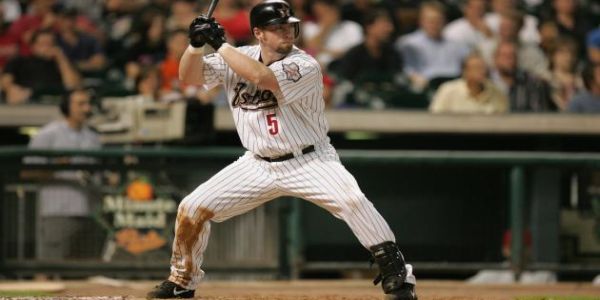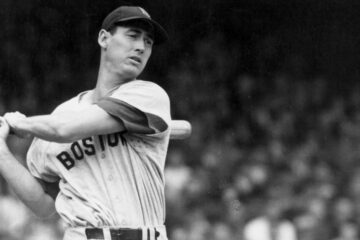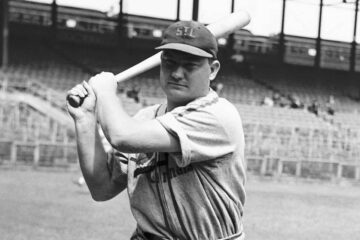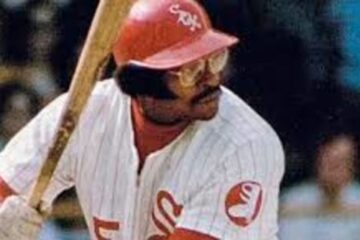Jeff Bagwell’s Case for the Hall of Fame


If I may indulge in the Hall of Fame again this offseason, we find that the Hall of Fame is ground zero in the debate between numbers and conventional wisdom. In the many debates I had online, none was more intense than the debate over my hometown hero Jeff Bagwell. Bagwell may not be ground zero himself in this debate, but he’s pretty darn close. The debate between numbers people and conventional wisdom people may not be that old, but it compares favorably with the battle between people of faith and people of science.
The people of science think the people of faith are holding onto the times of old and won’t admit when evidence might prove their assumptions wrong. People of faith accuse people of science of sucking the joy and majesty out of life. Fast-forward to the modern era and we see the same argument in baseball. Numbers people are sucking the joy out of the game. Proponents of WAR (Wins above replacement) tell us that Jeff Bagwell ranks fourth in WAR amongst full-time first basemen after 1900. Conventional wisdom tells us we know a Hall of Famer when we see one and nearly half of the voters in the BBWAA and conventional fans say the same.
Allow me to make the case for both. You can believe in the beauty and majesty of the game and believe in evidence at the same time. Just like the Deists of the 18th century, beauty and proof can exist at the same time. Allow me to use conventional numbers to prove what fancy numbers like WAR show. I will compare Jeff Bagwell with his contemporaries in the Hall of Fame (Frank Thomas) and several others who are either currently on the ballot or have been on the ballot. We will even throw in Jim Thome because he will be on the ballot shortly.
|
PA |
H |
2B/3B |
HR |
Runs |
RBI |
BB/HBP |
|
|
9431 |
2314 |
520 |
449 |
1517 |
1529 |
1529 |
|
|
8657 |
2038 |
501 |
473 |
1241 |
1512 |
1281 |
|
|
10174 |
2490 |
465 |
493 |
1349 |
1550 |
1344 |
|
|
7660 |
1626 |
258 |
583 |
1167 |
1414 |
1392 |
|
|
12046 |
3020 |
623 |
569 |
1663 |
1835 |
1440 |
|
|
10075 |
2468 |
507 |
521 |
1494 |
1704 |
1754 |
|
|
10313 |
2328 |
477 |
612 |
1583 |
1747 |
1816 |
If you listen to the conventional wisdom folks, they’ll tell you that Bagwell’s career was too short and that he is hurt by the fact that he didn’t reach 500 career home runs. Take away the stain of steroids and that seems to be the dividing line between getting in and not these days. Bagwell has a short window until Jim Thome joins the ballot in 2018. If that happens before Bagwell is voted in then he likely won’t be.
However, a deeper look into the conventional numbers above demonstrate the problem with “I know one when I see one” philosophy. Yes, Bagwell is seventh out of seventh in home runs among the seven modern candidates, but he is also second in doubles and triples, third in runs scored, and third in walks plus hit by pitches. That might not be great shakes, but given the relative brevity of his career (fifth in plate appearances) this is considerable.
This comes back to the point of knowing a Hall of Famer when you see one. Sometimes greatness is harder to see than you think. What made Bagwell great is not the same thing that made a Willie Mays great or even a Randy Johnson. Bagwell was about subtlety. He did the little things that most people don’t see. Some of that greatness can be seen when we peel back the onion. Again, all the numbers you see are basic numbers that come without the assumptions of a WAR. Let’s see if Bagwell begins to look better.
|
On Base |
Outs |
TB |
BPO |
RP |
OBA |
|
|
Jeff Bagwell |
3843 |
5887 |
4213 |
.975 |
2597 |
.407 |
|
Carlos Delgado |
3319 |
5498 |
3976 |
.956 |
2280 |
.383 |
|
Fred McGriff |
3834 |
6604 |
4458 |
.868 |
2406 |
.377 |
|
Mark McGwire |
3018 |
4797 |
3637 |
1.049 |
1998 |
.394 |
|
Rafael Palmeiro |
4460 |
7858 |
5388 |
.869 |
2929 |
.370 |
|
Frank Thomas |
4222 |
6101 |
4550 |
1.033 |
2677 |
.419 |
|
Jim Thome |
4144 |
6354 |
4667 |
1.020 |
2718 |
.402 |
The name of the game on offense is avoiding outs. Essentially, outs are the blood currency of the game. Every team gets 27 of them and the better you are at avoiding the better you are at scoring runs. When judging offensive players through the prism of outs you look at how often they get on base (OBA) and how many bases they can produce for every out they produce (BPO). Bagwell ranks second in on base average and fourth in bases per out.
Similarly, we see that he produces 2597 runs (RBI + Runs – HR) which puts him fourth among this list. So, when we breakdown hitting performance into its components we find that he finishes in the middle of the pack as a hitter. So, how did the geniuses that figured up WAR have him as better than all of these guys? The answer lies in the details. There is more to the game than just what happens in the batter’s box.
Anyone that watched Jeff Bagwell play knows that he was about as good at running the bases as anyone. He stole bases (which is rare for a first basemen) but that’s not what made him great. He could go from first to third, first to home, and second to home as good as anyone. He knew how to cut the bases just so to run as efficiently as possible. Of course, the same could be said about fielding. Bagwell had terrific range and had an excellent arm for a first baseman before his arthritic shoulder zapped him of his greatness.
|
SB |
Rbaser |
Rfield |
|
|
Jeff Bagwell |
202 |
+31 |
+54 |
|
Carlos Delgado |
14 |
-25 |
-65 |
|
Fred McGriff |
72 |
-22 |
-34 |
|
Mark McGwire |
12 |
-15 |
-29 |
|
Rafael Palmeiro |
97 |
-8 |
+48 |
|
Frank Thomas |
32 |
-24 |
-65 |
|
Jim Thome |
19 |
-27 |
-45 |
This is where the WAR comes from. It is the culmination of a player’s contribution on the field. It throws in what they do in the batter’s box, on the bases, and with the glove. Unfortunately, baseball-reference.com does not include fielding runs above replacement or base running runs above replacement. We don’t have the same kind of view of absolute value that we have with the other numbers. However, we see that if we add the two together, we find that Bagwell is 85 runs above average when we combine fielding and baserunning. Rafael Palmeiro is next closest with 40.
It drops precipitously from there. Bagwell’s primary competition for top spot in the era comes in the form of Frank Thomas. Both got on base with regularity and combined that skill with impressive power. However, when we went to baserunning and fielding we see that Thomas rolls in with a negative -89 runs. Therefore, there is a difference of 174 runs.
Those that just watched Bagwell hit and hoped for home runs were missing the point. He beat you with his glove. He beat you with his legs. He beat you by drawing walks. He beat you by hitting doubles and triples. People who missed that proved that sometimes you won’t know a Hall of Famer when you see one. And I said that without even bringing up WAR.






1 Comment
MrFantasyFreak.com has a fantasy baseball draft guide for free. Just wanted to throw that out there.